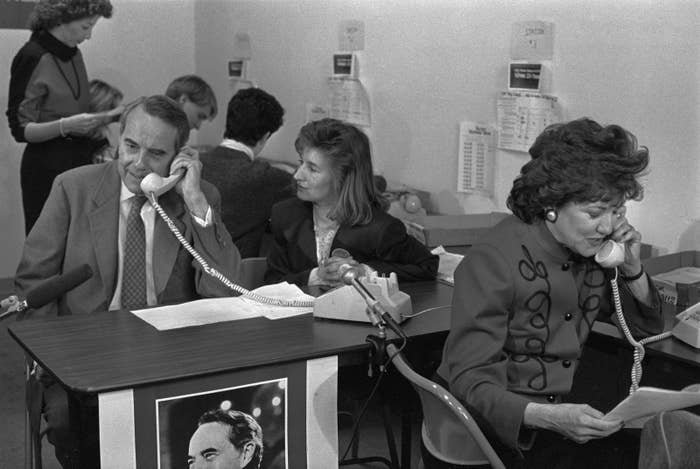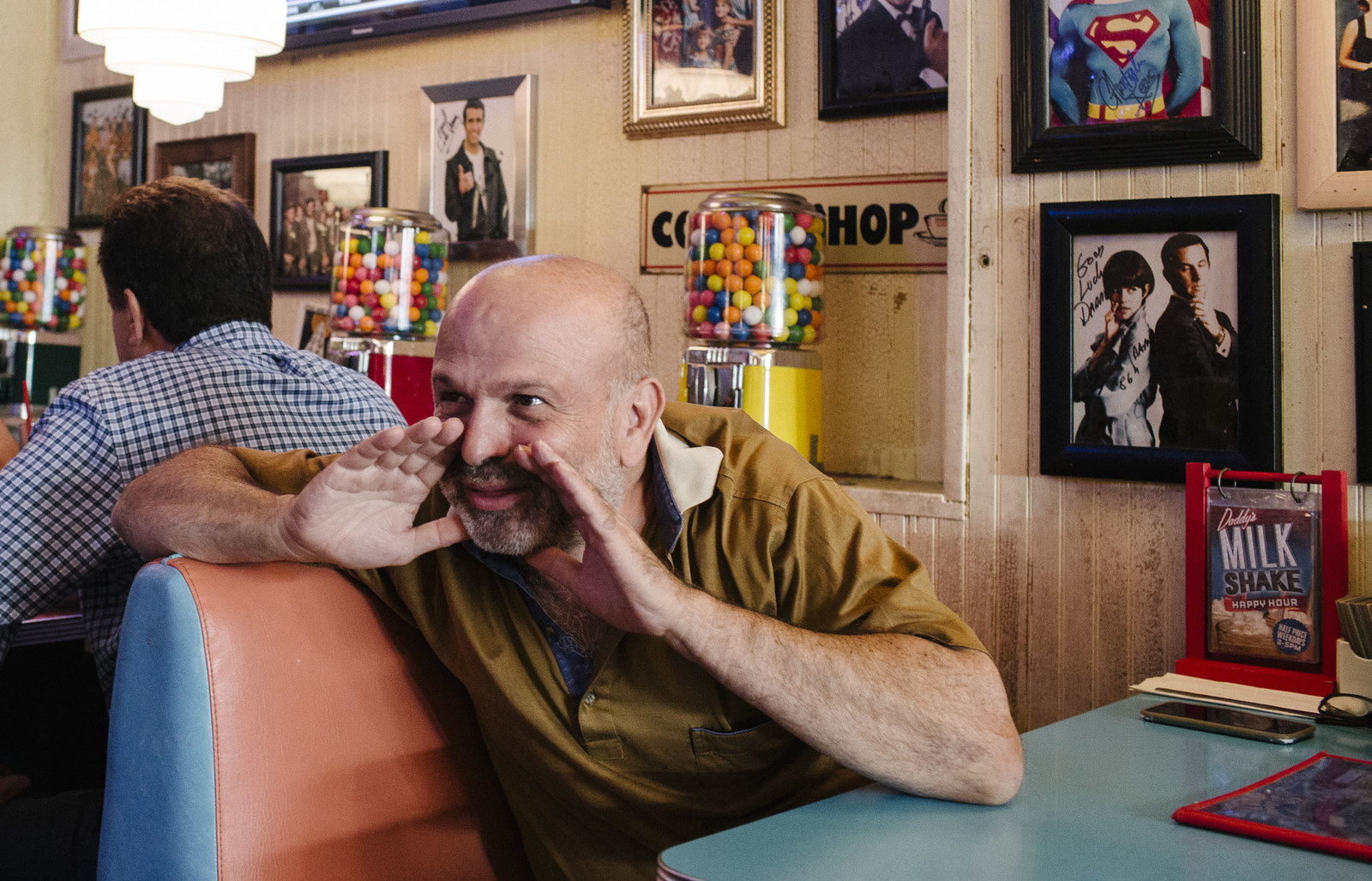When Paul Manafort resigned last Friday morning, I was sitting at a brightly colored diner on Park Avenue, Big Daddy’s, eating eggs opposite an old friend of his.
You may know Steve Goldberg’s work, if not his name. He first made national waves working for Bob Dole’s presidential campaign in 1995, for what Newsweek described as “thousands of anonymous phone calls telling Iowa Christians that [Republican candidate Steve] Forbes was wobbly on abortion.”
During Hillary Clinton’s first campaign for Senate, in 2000, Goldberg worked for the New York Republican Party, and flooded voters’ phones with calls tying Clinton to support from a group misleadingly described as one that ''openly brags about its support for a Mideast terrorism group — the same kind of terrorism that killed our sailors on the U.S.S. Cole.''
And in Israel last year, a wave of Goldberg’s phone calls on behalf of Benjamin Netanyahu’s Likud Party made headlines on election day for referring to the American president as “Hussein Obama.”
Steve Goldberg is a kind of underground legend in Republican politics — best known for inventing what is now called “push polling” — but one who has operated more or less under the media radar since Dole’s bid ended in recriminations and a messy federal inquiry into campaign spending.
Today he, like many Republicans, believes his party has lost its way, and he has something to offer. His, though, is not exactly patrician handwringing. Rather, he worries that the trade he invented is becoming a “lost art." Where are the phone calls now that hit you over the head with a hammer, and upset some people enough that they make news? And which give the campaign a glimpse into where you stand in the meantime?
He worries that the GOP has gone soft. He thinks even Donald Trump isn’t campaigning viscerally enough.
“I’m sorry, Neanderthal is real,” he said, explaining his credo. Neanderthal “still exists somewhere inside there, OK? You have to protect your women and your children.”
Goldberg and I have talked occasionally through the years about his worry that his techniques are undervalued. He had been hoping Manafort would bring him into the Trump campaign, but as the notion that his old friend would invite Goldberg into the fold faded a bit, he called me up to talk. He is a trader of favors, and he believes — accurately — that I owe him one: One of his rare appearances on the record was confirming a big story for me in 2012 about money that went missing from former Utah Governor Jon Huntsman's campaign. (Some of that money, needless to say, Goldberg thought should have gone to him.)
I was late to see Goldberg, whose wife had persuaded him to (just barely) clean up, and who had only spilled a little breakfast on his shirt. Goldberg, who was born to Orthodox Jewish parents in Crown Heights in 1953, is devout and fiercely tribal. He had spent a lot of time talking to the notoriously bare-knuckled Republican consultant Lee Atwater — who encouraged him to develop push polling, and to keep the practice secret — about the older man's regrets about anti-Semitic campaigning, and now refers to Atwater as "Lee of blessed memory." I arrived at the diner to find him giving grandfatherly Jewish advice to my photographer.
He wanted to be a lawyer but wound up in politics, first working for Democrats, including the 1980 campaign of Chuck Schumer (a “prick”), before following the Upper West Side Svengali Dick Morris rightward to the Republican Party. He worked both for Reagan and for the Democratic Speaker of the House, Tom Foley, in 1984.

Goldberg had learned phones — telemarketing, as the game is known outside politics — working for a DNC contractor in the 1970s, and he became one of a handful of masters of the trade. When he started, he was working on the frontier of two pillars of American politics: data and persuasion. He resisted technology before it was cool: Goldberg has always relied on phone banks full of hundreds of people making phone calls for near-minimum wage, rather than on the cheaper recordings — robocalls — that began to proliferate in the 1990s.
And by the time of Dole's campaign in 1996, the Newsweek embed — back then, a reporter would be given full, behind-the-scenes access on the condition they not publish until after the election, something that has given way to the Game Change franchise — described him as “a short, stocky New Yorker who looked like Detective Sipowicz on NYPD Blue.''
He also played a behind-the-scenes role in that campaign’s bitter infighting, at one point arriving in the middle of the night to warn the campaign manager his rivals were plotting.
"I had to tell you,'' Goldberg reportedly said. "It's the law of the jungle. Kill or be killed.” While he waited to meet me, Goldberg composed on his phone a list of talking points — insights, grudges, ideas. It read in full:
Cuban
RNC primitive data knowledge
Rasputin
Lee
Space future millennials
Bottom out trump most campaigns will figure out they need to be the anti Hillary hero in their state and district and usurp that dynamic from trump and say elect me cause Hillary will be pres and u need me the Republican to protect u!McCain
Btw I did both the r President and d speaker in 1984
(Mark Cuban, Steve has an idea for you. Call him.)
Goldberg’s belief that the Republicans are lost has a villain. He worked for George H.W. Bush in 1988 and 1992, and his phone calls incurred enough gratitude to earn a seat on the board of the Holocaust Memorial Museum in Washington. But he never got along with their son's political guru, Karl Rove, who he believes “destroyed the Bush family." (Goldberg describes George W. Bush as "mentally challenged.") Rove, in Goldberg's view, pulled the party toward a clinical, hard-right economic conservatism and foreign policy adventurism, and away from the more practical, visceral appeals Goldberg used to deliver on the phone. Rove was ruthless toward rival consultants: He blacklisted his old Texas rival, McCain adviser John Weaver, who was a Goldberg ally, and Goldberg — who had run into financial problems and lost his business in the late 1990s — found it hard to work in the Bush years.
Here in 2016, Goldberg admires Donald Trump’s core proposition: “His scenario is that the silent majority is angry, powerful, and ready to rumble.”
But he doesn’t think the Republican Party is capable of delivering on it.
“The whole culture of the RNC right now is hiding behind algorithms, hiding behind apps, and not interacting with people,” he said.
“They’re primitive. Not so much in terms of the apps, the algorithm — sure, they’re selling their fucking snake oil, okay, but they’re primitive in how they use it and they’re lazy,” he said. “Because Republicans have no clue how to maintain the relationship with the voter. How to create and to cultivate one. And they think that you do an app and they check the box or do the roll call, you check the box, and now, OK, I’ve now campaigned.”
What’s missing, he said, is the “third dimension” — the human connection you get from someone calling you, arguing with you, listening to you. These are, he acknowledged, random minimum-wage workers, but he said that the practice of calling selects out the ones who are good at it — and that the ones who are good at it come to believe what they’re saying. “They become paid quasi-supporters,” he said.
“No Republican phone operatives right now have a clue,” he said. “They don’t know how to listen. They’re so primitive.”
Goldberg believes the power in politics comes in the questions you ask, not the answers you give, which is why the form of “polling” — even if the data is less important than the impression you leave — is so important.
“That’s really what Trump came from. He figured out the right question very early,” he said.
“Which is immigration?” I asked.
Goldberg shook his head patronizingly.
“Just fear,” he said.

Goldberg had hoped to get in on the Trump campaign. When we met earlier in the summer, he showed me some reassuring texts from Manafort, suggesting that some kind of gig was in the works. Even last Friday, he told me, “I really hope Paul does get empowered.” His Netanyahu connection also gives him a line into the mercurial casino magnate and Republican mega-donor Sheldon Adelson, who is Netanyahu’s key patron, and who was the subject of reports earlier this summer that he would finance a pro-Trump super PAC, one of many things that hasn’t come through for The Donald.
“The thing that upsets me the most — and I do hope you use this line, I love this line: I want to be in the O.K. Corral. Because the presidential campaign is the O.K. Corral. My job would be to have Trump’s back or whoever and take out the opposition. That’s what I want,” he said.
We left, and by the time I got back to the office, Manafort had resigned from the campaign. I texted Golberg to ask for his reaction.
“Game over!” he replied. “The bottom falling out and being so bad it probably won’t affect the Senate and House lol.”
